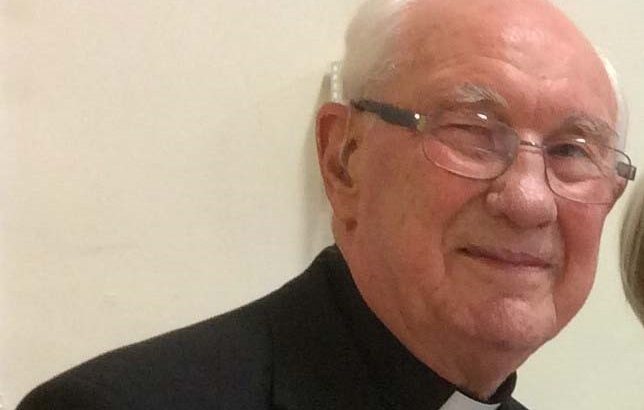Personal Profile
Canon Brendan Murray’s career as a priest began in 1957 and has spanned six decades of momentous change on the island of Ireland, some for better, some for worse. “I grew up in a different age from the present one, where religion was accepted simply as a matter of fact,” Fr Murray tells The Irish Catholic.
“I was in a family where prayers were said, and I remember as a teenager being an altar server. My two brothers and I were encouraged to go to daily Mass,” he adds.
Fr Murray was ordained in 1957 and received his first official posting in June 1958”
It was this daily attendance at Mass which he thinks brought him to the attention of the parish priest, who asked him if he would consider the priesthood. It was in his mind from then on, but it wasn’t until he finished school that he made a decision.
“I did quite well at my exams and actually got a scholarship for the university,” Fr Murray says. “I met (my local priest) Fr Cunningham on the Glen Road and he asked me how I had got on. I told him that I’d got the scholarship for the university. Before I could say I was thinking of doing another year of advanced maths, he said ‘Well Brendan what about it?’ And I thought for about 20 seconds and I said, ‘Alright father, I’ll give it a go’! That was when I made up my mind.”
Fr Murray was ordained in 1957 and received his first official posting in June 1958. He first worked as a chaplain to a Dominican conference, before being posted to his home parish, St Teresa of Avila’s, the Glen Road, Belfast. He was also given the role of spiritual director to the presidium of the Legion of Mary in his area, beginning a long career ministering to lay organisations. The group he spent most of his time ministering to was the Apostolic Workers.
Foreign missionaries
“The Apostolic Workers have been a feature of my life for quite a long time now, about 50 years,” he explains. “It was an organisation founded in Belfast in 1923, to help foreign missionaries. They meet in groups, they used to make vestments, chasubles, albs, things like that which they would send to the missionaries. It spread out across the diocese. Every year, we have a special Mass on Mission Sunday, though this year it went by the board.”
His connection with lay missionary groups was happenstance, Fr Murray explains, rather than a specific calling: “It was a minor part of my work, my work was mainly in parishes. I went from the Dominicans to a parish in Bangor and was lovely parish work there for 13 years, then I was in various parishes in Belfast.”
Fr Murray ministered during the height of the troubles, which had a direct effect on his ministry”
Fr Murray loved the parish work, especially going out and meeting people: “I like meeting people and I generally get on well with people,” he says. “It’s not so easy now, but one of the things I liked doing was going round and calling or doing visitations, not just to the house bound. I was quite shy when I was young and to begin with it was quite something to go up and ring the doorbell of a house on an afternoon or an evening. But after a bit I became very used to it then.
“I found that very rewarding and getting to know people, it’s really done in their houses. You see them at church, they’re a big mass of people there, but when you go to the house, you get to know them much better there. Even at the moment now, although retired, I enjoy going into schools, talking to the children.”
Fr Murray ministered during the height of the troubles, which had a direct effect on his ministry. Two of his parishioners were killed in separate shooting incidents outside his parish church.
“There were some very, very sad experiences,” Fr Murray says. “Part of a priest’s job of course is ministering to families who have had bereavements. Sometimes of all ages of people – families who have lost a baby for instance, families who have lost an elderly person. But where families have lost someone as a result of murder, that’s very difficult indeed.”
While they had no effect on his faith, the second shooting incidence did impact his physical health, Fr Murray believes.
“The gunmen had shot at two women, killing one of them. They also shot six bullets at Mr Travers, a local magistrate, and I could hear the shots, but I didn’t know where they came from so I ran around and when I got there, Mr Travers he was writhing in agony and I anointed him. Mr Travers was very ill, he was in intensive care for a month and I visited him regularly. It was some time after that I can remember having high blood pressure. It was only later that I associated it with that time.”
Some people say we were forced to go to Mass, but that wasn’t my experience, it was something you did, like you’d have your Sunday dinner”
Ireland has changed significantly, Fr Murray notes, some for the better, some for the worse.
“Thank goodness, there’s much less trouble in Northern Ireland,” he says. “But the Ireland I grew up in – I’d hardly recognise it now at all. Some people say we were forced to go to Mass, but that wasn’t my experience, it was something you did, like you’d have your Sunday dinner. It was part of life. Now of course, that’s very, very different.”


 Ruadhán Jones
Ruadhán Jones Canon Brendan Murray
Canon Brendan Murray 